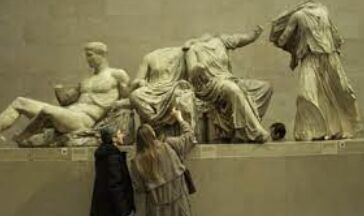Greece and Britain Clash Over Parthenon Sculptures: Meeting Cancelation Ignites Ownership Dispute
A heated dispute between Greece and Britain over the ownership of the Parthenon Sculptures has led to a canceled meeting between the two leaders, escalating tensions and jeopardizing bilateral relations.
Athens and London are entangled in a heated dispute over the ownership of the Parthenon Sculptures, also known as the Elgin Marbles, which has led to the cancellation of a planned meeting between the two leaders. The Greek government accuses Britain of displaying a "lack of respect" by abruptly canceling the meeting after Greek Prime Minister Kyriakos Mitsotakis raised the demand for the return of the ancient Greek sculptures from the British Museum. The controversy stems from the removal of the 2,500-year-old sculptures by British diplomat Lord Elgin from the Parthenon temple during a period of Ottoman Turkish rule in Greece.
Today's diplomatic dispute over the #Parthenon Marbles between our allies is unfortunate. In 1801, Lord Elgin had chunks of the Parthenon’s freize sawn off and shipped to England, where they were sold to the British Museum to help pay off Elgin’s debts. A @YouGov poll two-years… pic.twitter.com/7WgIkcsTmU
— Mark Svensson (@MarkSvensson) November 28, 2023
The sculptures are now divided, with about half of the 160-meter frieze housed in London's British Museum and another 50 meters displayed in Athens' Acropolis museum. Greece has persistently called for the permanent return of the sculptures, arguing that their separation is akin to "cutting the Mona Lisa in half." However, the British government rejects this characterization and maintains that the British Museum remains the rightful owner, citing a law that prevents the disposal of items in its collection in most circumstances. The cancellation of the meeting between Prime Minister Rishi Sunak and Mitsotakis further escalated tensions.
Britain claims that both sides had previously agreed that the meeting should not be used as a platform to rehash settled matters. Sunak's spokesman stated that when assurances are given and not adhered to, there are consequences. However, a senior Greek government official dismissed this statement as inaccurate, emphasizing that disagreeing on certain issues should not hinder dialogue. Both Greece and Britain lamented that the cancellation jeopardized the opportunity to discuss pressing global issues, including conflicts in Gaza and Ukraine, and the climate crisis.
Additionally, the two leaders aimed to address a UK-Greece migration action plan. Greece's government spokesman emphasized the cancellation as unprecedented and disrespectful but expressed a desire to maintain the countries' generally positive relations. Meanwhile, a meeting between British Foreign Secretary David Cameron and his Greek counterpart George Gerapetritis took place on the sidelines of a NATO ministers' meeting in Brussels. The ministers acknowledged the need for cooperation to safeguard bilateral relations and tackle shared challenges, including the Parthenon sculptures disagreement.
Critics, including some British opposition parties and a campaign group called the Parthenon Project, condemned Sunak's decision to cancel the meeting. The group proposes a solution that would see the sculptures reunited in Athens without requiring agreement on ownership. Former Conservative culture minister and advisor to the group, Ed Vaizey, criticized Sunak's involvement, stating that it had not helped the relationships between Britain and Greece.
While the dispute highlights the complexities surrounding cultural heritage, it also has implications beyond the Parthenon sculptures. Both sides expressed concerns about the potential repercussions and the potential precedent it might set if an agreement is reached to return the marbles. Sunak's spokesperson described it as a potential "slippery slope" that Britain would not support. As tensions persist, it remains to be seen how Greece and Britain will navigate this long-standing dispute and its impact on their bilateral relations, as well as the broader debate surrounding repatriation of cultural artifacts.




